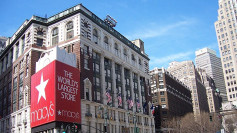The U.S. Department of Commerce on Monday finalized sweeping tariffs on solar panels imported from Southeast Asia, with rates climbing as high as 3,500% for some producers, intensifying a trade crackdown that American manufacturers say is aimed at halting China's circumvention of existing import penalties. The decision triggered a pre-market rally in First Solar Inc. shares, which jumped more than 7%.
The tariffs stem from a case initiated last year by Arizona-based First Solar, Korea's Hanwha Qcells, and several smaller U.S. producers operating under the American Alliance for Solar Manufacturing Trade Committee. The petitioners alleged that Chinese solar firms operating in Malaysia, Cambodia, Thailand, and Vietnam were exporting products below cost and benefiting from unlawful subsidies.
"These are very strong results," said Tim Brightbill, an attorney for the domestic manufacturers, during a press briefing. "We are confident that they will address the unfair trade practices of the Chinese-owned companies in these four countries, which have been injuring the U.S. solar manufacturing industry for far too long."
Among the finalized tariffs, Trina Solar's products from Thailand were hit with a combined anti-dumping and countervailing duty of 375.19%. Jinko Solar's Malaysian exports received a much lower combined duty of 41.56%. Products from Cambodia face tariffs exceeding 3,500%, reflecting the producers' decision not to cooperate with the U.S. probe.
The duties will not be officially imposed unless the U.S. International Trade Commission determines in June that the American solar industry suffered material harm due to the imports. Until then, the tariffs remain provisional.
The implications are substantial. Imports from the targeted countries accounted for more than $10 billion in solar products last year, forming the backbone of U.S. supply. Since the case began, imports from Malaysia, Vietnam, Thailand, and Cambodia have declined sharply, while shipments from countries like Laos and Indonesia have risen.
The move follows earlier action by the Commerce Department, which in November announced tariffs ranging from 21% to 271% on Chinese solar panels sold through Southeast Asian subsidiaries. President Donald Trump, during his 2024 campaign, promised more aggressive tariffs on Chinese-linked imports, including in the solar sector.
Despite the protectionist push, the tariffs have drawn criticism from some industry groups. The Solar Energy Industries Association has warned the duties could undermine U.S. solar production by raising the cost of imported cells used by domestic panel assemblers. SEIA officials were not immediately available for comment.
First Solar, a direct beneficiary of the trade case, saw its stock price rise to $122.45 in pre-market trading Tuesday. The company's shares have gained favor among analysts, including Piper Sandler's Kashy Harrison, who forecasted potential upside from protectionist tailwinds earlier this year.
First Solar holds a growth rating of 96.08% and a quality rating of 89.80%, according to Benzinga's proprietary rankings, which assess earnings and revenue trends over various timeframes. The finalized tariffs add further momentum to the company's outlook amid a shifting global solar trade landscape.






